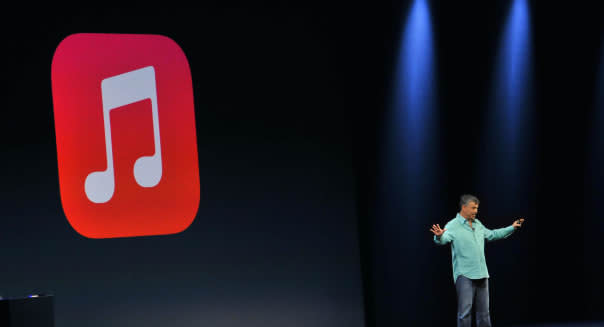Money Minute: Demand for Music Downloads Slips; Investors Ready for Flood of Earnings
Music downloads take a sudden downturn. That's one of five money stories you need to know this Monday.
This is the busiest week of the corporate earnings season, with nearly one-third of the companies in the S&P 500 providing quarterly report cards. Among those we'll be paying close attention to: Microsoft (MSFT), McDonald's (MCD), Boeing (BA), AT&T (T), Procter & Gamble (PG), Amazon.com (AMZN) and Ford (F). All of them are leaders in key sectors of the economy, and their performance will tell us a lot about how their industries are performing, and give important clues about consumer spending and the overall economy.
Investors would love more of the same, after the market posted strong gains last week. The Dow Jones industrial average (^DJI) rose more than one percent, the Standard & Poor's 500 index (^GPSC) jumped 2 percent to a record high, and the Nasdaq composite index (^IXIC) soared more than 3 percent.

It was just a decade ago that the iTunes store debuted, raising fears that it would mean big trouble for the music industry. Instead, it sparked a wave of buying music downloads. But now, for the first time, Nielsen says downloads appear headed for an annual decline. The reason isn't yet clear, but some analysts point to the rising popularity of streaming services such as Pandora (P), Spotify, YouTube and Apple's new iTunes Radio.
LinkedIn (LNKD) has used information from its 238 million users to rank to most in-demand employers to work for, and tech giants and consumer-product companies dominate the list. Google (GOOG) and Apple (AAPL) are first and second, followed by Unilever (UN), Procter & Gamble, Microsoft and Facebook (FB). Rounding out the top 10 are Amazon, Pepsi (PEP), Shell (RDS-A, RDS-B) and the business consulting firm McKinsey.
And the Justice Department is expected to announce this week one of the biggest-ever corporate penalties to come out of the financial crisis of 2008. News reports say the government and banking giant JPMorgan Chase (JPM) have agreed on a jaw-dropping $13 billion settlement of civil charges related to the sale of mortgage-backed derivatives. But this accord doesn't stop the government from seeking criminal charges.
-Produced by Drew Trachtenberg.
%Gallery-189563%

